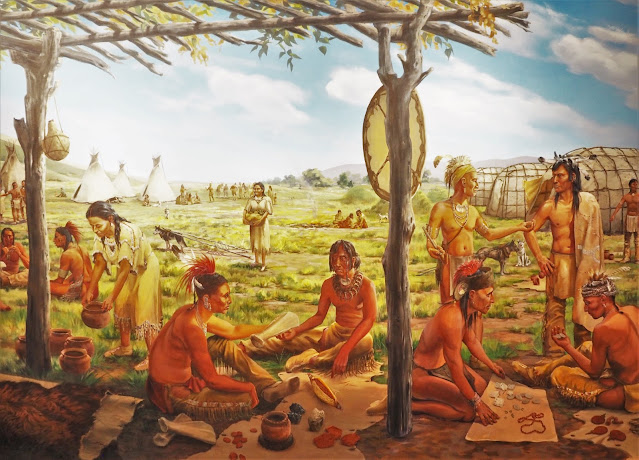Men, women, and children huddled in covered wagons crossing endless prairie seem to beckon all by themselves some hovering, mounted Native war parties up there on a rise--see 'em?--an army of warriors aboard nervous paint ponies, holding bows or maybe a feathered lance or even a carbine.
In Iowa, forget it. The Ioways were given two years to evacuate the territory way back in 1824; the Sac and Fox were in Kansas by 1845. Indians weren't the great danger to wagon trains through Iowa, not by a long shot. Real danger lurked where running water crossed the paths because rowdy prairie rivers cut rigid cliff banks that required chains and ropes and engineering feats, not to mention brute strength for those wagons to conquer.
I can't help but think that crossing those rivers established the outline of the sweet saga of northwest Iowa's Luxembourgian people, the soul of their story. It isn't the statue itself, the image of Mary, mother of Jesus, and our Lord, the statue that today stands in the entry way of Spaulding Catholic School, in Alton. The blessed statue is beautiful, in large part, not because it's so perfectly rendered: if you want magnificent sculpture, go to Rome, not Alton.
Nor is it rare. That a people so devotedly Roman Catholic would somewhere in their domain own and adore a statue of Mary, Mother of Jesus, their own Madonna and Child, comes as no shock at all. Nothing my Dutch Calvinist childhood taught me made the Catholics so, well "Catholic" as their adoration of Mary. Every afternoon my mother's kitchen was full of holy rosaries prayed in unison on local radio--"Holy Mary, full of grace, blessed art thou among women and blessed is the fruit of thy womb, Jesus." "Vain repetitions" my dad called it, using his own referenced biblical language.
What's so blessed about Spaulding school's Mother and Child is the story of its own adoration. When 38 pioneers left St. Donatus, Iowa, just south of Dubuque, in 1870, they took the sculpture with them. Literal truth here may get a little fuzzy and warm-hearted, but the way they like to tell the story is almost certainly indisputable. There were times on the passage west, maybe when crossing streams specifically, that one of the pioneers, probably a woman, made sure she was holding the sculpture--it isn't tiny. May well have been wrapped it in a blanket, maybe even a buffalo hide, when she carried it down the banks and through deep waters.
That's the story they like to tell themselves and anyone else who'll listen, how the statue so preciously came, and how, today, you can still see it if you just step in the door at Spaulding Catholic.
Why blue? Tradition that goes back to the Bible, where the people of Israel, God's chosen, are told to wear blue. But if the Bible isn't good not enough, believers have for centuries associated blue with mystery and purity, the color of the sky's transcendence. I can't imagine my parents knew any of that.
So the story goes that the Spaulding statue came with the people all the way to the northwest corner of the state, sometimes being held in the very first of those ox-drawn wagons, as if the entire trip was pilgrimage, or, better yet, a processional in fine Catholic tradition.
The story goes that one of the pioneers who came out west was the son of the sculptor, who likely did the statue in the old country to fulfill a requirement of the guild he wanted to be part of. It was made from wood shavings, and glue created from the bones of animals. When he came to America in 1847, he brought it with, and, 23 years later, when his son boarded one of those ox-drawn carts, he made sure his father's work came along.
My people, just down the road, would have considered the whole business idolatry, bizarre Catholic mystic silliness, like fish on Friday. In 1960, when I was 12 years old, I listened to my uncle hold forth from the pulpit of our local church on the danger America would be in should John F. Kennedy, a Roman Catholic, become President of these United States. Last Sunday, in England, worshippers in Falmouth were shocked to see the President of the United States and his wife enter the sanctuary for mass before the last day of the summit.
Last November, I don't think anyone among the people down the road said anything about Biden's devout Catholicism.
And me? I love the story of the Spaulding statue, admire, even adore it, in my own Protestant way. Just think--there are a dozen wagons, maybe more, behind huge, double-yoked oxen, plodding along on thick prairie ground in long grasses through native flowers grown as tall as the beds of the wagons.
And in the very first one, there's a woman--or a boy maybe--whose arms are around a statue he holds like a body across his lap, a blanket around the Madonna, as if some insulation was required.
That's the way they cross those rowdy rivers. That's the way they cross all that open land.
That's a wonderful story, greatly worthy of all of our adoration.











































